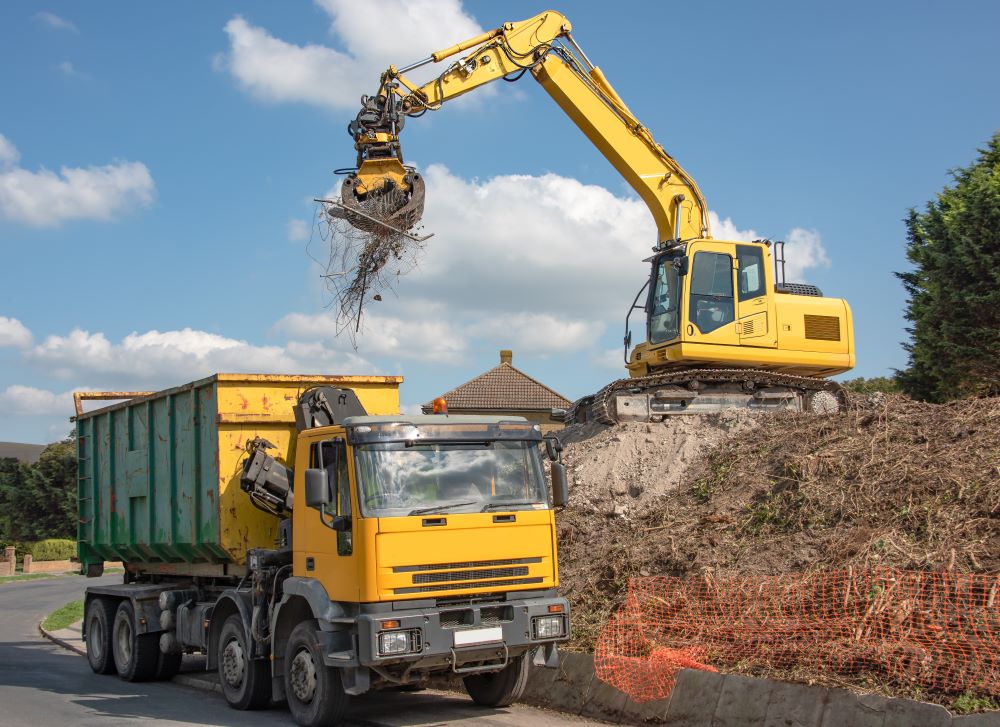
Residential vs. Commercial Demolition
The demands and specifications of residential and commercial projects might vary greatly when it comes to demolition. These two forms of demolition need meticulous planning and execution due to the size of the task and environmental constraints. Large and tiny individual residences are usually removed during residential demolition. Conversely, commercial demolition includes a broad spectrum of buildings, including warehouses, retail malls, office buildings, and more.
Safety is a major consideration in residential demolition operations, especially when nearby houses and structures are involved. Preventing damage is a top priority when it comes to demolition. Commercial demolition projects, on the other hand, could require extra permission and adherence to local laws, particularly if the structure includes hazardous chemicals.
OUR SERVICES
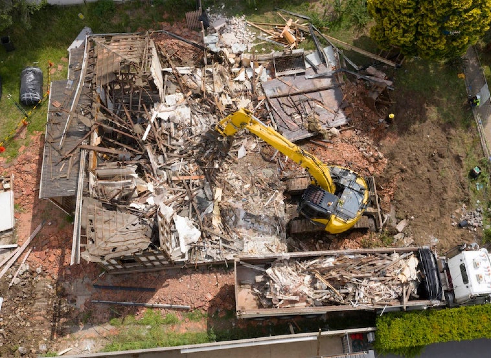
Structure Demolition. Residential, Commercial & Industrial
If your structure poses a health, safety, or environmental risk, demolition can prevent costly citations or fatal accidents. While this may seem daunting, you are just a phone call away from having your residential demolition done professionally, responsibly, and at a great price.
Talk to a Demolition Specialist Now! 916.249.5001
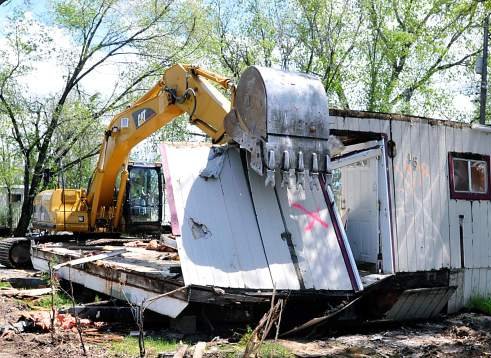
Mobile Home Demolition
We demolish and haul away mobile homes. Any size, anywhere, anyhow. We are fast, clean and competitive. We serve most of Northern California. There are many factors to consider when removing or demolishing your old trailer, mobile home, or manufactured home like: the processes involved, costs, time, contractors, debris, and permits.
Talk to a Demolition Specialist Now! 916.249.5001
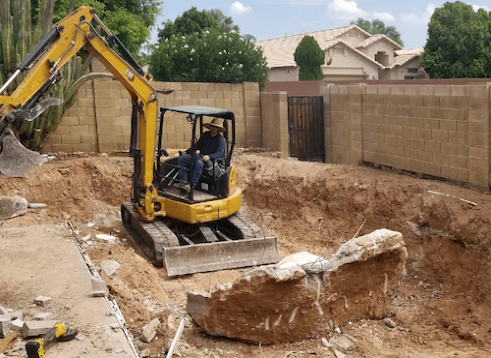
Pool Demolition
When removing a pool in Sacramento, California with the professional demolition team of Maxton Demo, you’re guaranteed peace of mind from beginning to end. From your initial request for an estimate to clean-up, you can expect our pool demolition process that’s completely professional and safe.
Talk to a Demolition Specialist Now! 916.249.5001
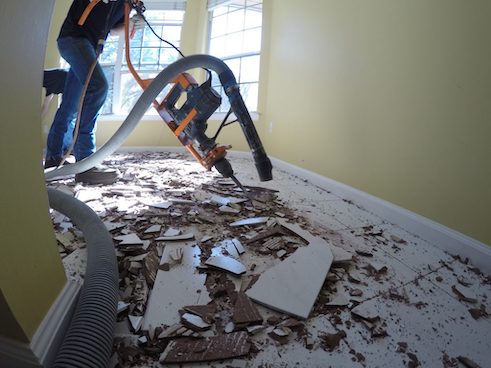
Floor Demolition
Flooring demolition, like any other major home renovation work, requires a specific set of skills and tools to be performed properly. You need experts in flooring demolition to get you the best floors possible. Contact us to find out more about how we can help you today.
Talk to a Demolition Specialist Now! 916.249.5001
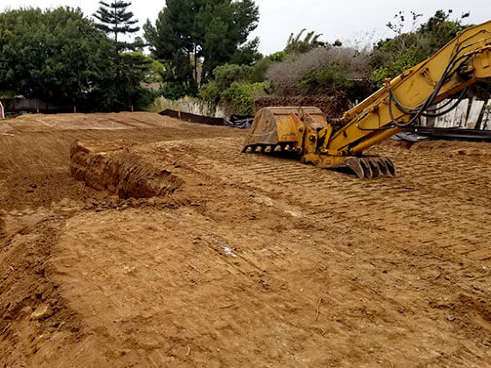
Grading & Excavating
If you need an experienced excavator and grader in Sacramento, call us today. One of the many reasons that residential, commercial, and industrial customers choose to work with us is because we’re able to provide a broad range of services to help construction-related projects get done in less time and at a reduced cost.
Talk to a Demolition Specialist Now! 916.249.5001

Roof Snow Removal
Heavy snow & ice dams can cause significant roof and home damage. Roof Snow removal is our specialty during the winter months. Serving the Sacramento, California area for 10 years, we can get your roof snow removed and promise a quick response and reasonable rates.
Talk to a Demolition Specialist Now! 916.249.5001
Understanding Residential Demolition
Residential demolition is the process of removing individual houses of any size. Residential homes may need to be destroyed for a variety of reasons. For example, it may be the result of significant structural damage, the existence of dangerous materials like asbestos, or just the need for reconstruction. For any cause, home demolition has to be carefully planned and carried out to guarantee safety and reduce any adverse effects on nearby buildings.
Types of Residential Demolition Projects
Projects involving residential demolition might vary in size and complexity. They may include removing a large residential neighborhood or destroying a single-family house. While large-scale projects could include the destruction of several buildings and infrastructure, small-scale residential demolition projects usually entail the removal of a single structure. A customized strategy is needed for every project in order to guarantee safe and effective destruction.
Areas We Service
Demolition Contractor Sacramento
Demolition Contractor Nevada City
Demolition Contractor Grass Valley
Demolition Contractor Gold Run
Demolition Contractor Emigrant Gap
Demolition Contractor Soda Springs
Demolition Contractor Tahoe City
Demolition Contractor Twin Bridges
Demolition Contractor Placerville
Demolition Contractor in Roseville
Demolition Contractor in Auburn
Demolition Contractor in Davis
Demolition Contractor in Dixon
Demolition Contractor in Esparto
Demolition Contractor in Folsom
Demolition Contractor in Lincoln
Demolition Contractor in Plymouth
Demolition Contractor in Rocklin
Demolition Contractor in Shingle Springs
Demolition Contractor in Vacaville
Demolition Contractor in Fairfield
Demolition Contractor in Yountville
Demolition Contractor in Antioch
Demolition Contractor in Concord
Demolition Contractor in Walnut Creek
Demolition Contractor in Lafayette
Demolition Contractor in San Ramon
Factors to Consider in Residential Demolition
When preparing for a home demolition job, there are a number of things to take into account. The distance between adjacent properties and constructions is one of the most important factors. When demolishing a building, safety precautions must be taken to avoid harming other structures. In order to protect both the environment and workers, it may also be necessary to handle and remove hazardous materials like asbestos or paint that contains lead.
Advantages of Residential Demolition
There are several benefits to residential demolition, particularly in terms of redevelopment. Old or run-down houses may be demolished to make room for new buildings, reviving areas and raising property prices. Additionally, residential demolition makes it possible to get rid of buildings that could be dangerous or beyond repair, protecting present and future homeowners. In addition, the demolition process may provide a chance for material recovery or recycling, which would cut waste and advance sustainability.
Challenges in Residential Demolition
Residential demolition has advantages, but it also has drawbacks. The possible influence on nearby homes and buildings is one of the key obstacles. It takes careful preparation and execution to reduce the possibility of harm and guarantee the security of the local populace. Hazardous chemicals may also make demolition more difficult and require particular handling and disposal techniques. It is crucial to collaborate with seasoned experts who are aware of these difficulties and know how to successfully address them.
Understanding commercial demolition
Commercial demolition entails demolishing a range of buildings, including warehouses, retail establishments, and office buildings. Commercial demolition projects, in contrast to residential ones, may require extra permission and adherence to local laws, particularly if the structure includes hazardous chemicals. Commercial demolition operations need specialized equipment and a high degree of skill due to their magnitude and complexity.
Types of Commercial Demolition Projects
The scale and complexity of commercial demolition operations may vary substantially. They may include removing a full commercial center or industrial complex or eliminating a single office building. Every project needs a different strategy, taking into account elements like the structure’s dimensions, location, and building materials. In order to minimize disturbance to the surrounding communities and guarantee the safe evacuation of any hazardous items, commercial demolition often requires meticulous preparation.
Factors to Consider in Commercial Demolition
A business demolition project requires careful planning that takes into consideration many elements. Among them is the existence of potentially dangerous substances like chemicals, lead, or asbestos, which call for particular management and disposal techniques. Furthermore, extra safety measures can be needed to protect employees and the general public due to the building’s close proximity to utilities, other structures, or traffic infrastructure. It’s also essential to follow local laws and secure the required licenses in order to prevent legal problems.
Advantages of Commercial Demolition
There are several advantages to commercial destruction, especially when it comes to urban rejuvenation and redevelopment. New development initiatives that attract companies and provide employment possibilities may be realized by demolishing obsolete or underused commercial properties. It is also possible to demolish structures that can be unsafe or physically unstable via commercial demolition. In addition, the demolition process may provide opportunities for material recycling or reuse, supporting environmentally friendly building techniques.
Key Differences Between Commercial and Residential Demolition
Are you considering a demolition project and want to know the main distinctions between residential and commercial demolition? No need to search any further—we’ve got you covered. Knowing the differences between these two kinds of demolitions is crucial, whether you’re remodeling your house or starting a large-scale business project.
Understanding commercial demolition
Demolition of commercial buildings, such as office buildings, warehouses, or retail complexes, is a complicated procedure. In contrast to residential demolition, which often includes demolishing smaller buildings like homes or flats, commercial demolition requires certain tools, licenses, and knowledge to handle the complexities of such tasks.
Because of the size and complexity of the buildings involved, commercial demolition requires meticulous planning and execution. An extensive evaluation of the building’s hazardous contents, environmental effects, and structural integrity is carried out prior to destruction. This evaluation aids in deciding on the most effective strategy and required safety measures for the demolition procedure.
In order to safely and effectively demolish commercial buildings, heavy equipment like excavators and wrecking balls is often needed. To guarantee a seamless and regulated demolition procedure, the demolition crew must consider elements including neighboring structures, utilities, and public safety.
A significant distinction in commercial demolition is the need for close collaboration with several parties. In order to minimize disturbance to the surrounding neighborhood, coordination with local authorities, utility providers, and other businesses is necessary. Furthermore, the removal and disposal of hazardous materials is a common component of commercial demolitions, necessitating rigorous attention to safety procedures and laws.
Understanding Residential Demolition
Residential demolition, as opposed to commercial demolition, usually entails smaller buildings, such as homes or flats. Even with the reduced scope, the procedure still has to be carefully planned and adhered to in terms of safety and legal requirements.
Residential demolitions are often done for a variety of purposes, including remodeling an existing home, erecting a new building, or making way for new construction. It’s crucial to take safety considerations, the influence on the environment, and zoning laws into account before starting the demolition.
Residential demolitions are often less complicated than commercial demolitions, which may entail many stories and intricate buildings. Even so, it’s crucial to evaluate the building’s structural soundness, spot any potentially dangerous items, and make plans for the debris removal process.
Several demolition techniques may be used, depending on the residential property’s location and size. These may involve controlled implosion for bigger buildings, manual disassembly, and mechanical destruction using excavators. The available area, nearby buildings, and environmental issues all play a role in approach selection.
Key Differences in Demolition Methods
Due to the variations in the scale and complexity of the buildings involved, there might be substantial changes in the techniques utilized in residential and commercial demolitions. In order to effectively demolish large-scale buildings, commercial demolitions often require more thorough planning and the utilization of heavy equipment. Conversely, residential demolitions could use less complex techniques like manual disassembly or mechanical demolition.
When conducting a commercial demolition, the demolition crew must thoroughly evaluate the building’s structural integrity and choose the best course of action to reduce risks and guarantee controlled destruction. This might include the use of selective demolition methods, in which certain parts of the building are demolished while others are left intact.
In contrast, residential demolitions often include the whole dismantling of the building. In order to provide room for future growth or construction, the demolition team’s primary goal is to safely demolish the whole structure.
The degree of cooperation needed for commercial demolitions is another significant distinction. Commercial demolitions need close collaboration with local authorities, utility providers, and adjacent businesses because of their larger size and possible influence on the surrounding region. While permits and following rules are still necessary for residential demolitions, there is often less external stakeholder cooperation.
Regulations and Permits for Commercial Demolition
To protect the environment, the public, and the safety of employees, there are a number of laws and permit requirements that must be followed while conducting commercial demolitions. Depending on the demolition project’s location and nature, these rules could change.
Getting the required approvals from local authorities is crucial before starting a commercial demolition. Detailed plans that include waste management plans, structural evaluations, and safety procedures are usually needed for these permits. Adherence to zoning ordinances, construction norms, and environmental restrictions is essential to guaranteeing a lawful and efficient demolition procedure.
Commercial demolitions may also need to adhere to certain industry norms and requirements in addition to obtaining licenses. These might include laws governing the removal of asbestos, noise abatement techniques, and the handling of hazardous waste. Following these rules reduces any possible negative effects on the environment and public health, in addition to guaranteeing compliance.
Regulations and Permits for Residential Demolition
Residential demolitions still need to follow rules and get permissions, even if they may not be as complicated as commercial demolitions. Depending on the demolition project’s location and type, different criteria could apply.
Homeowners or property owners must get the required licenses from local authorities prior to starting a residential demolition. Usually, in order to get these permissions, one must submit blueprints, carry out structural analyses, and specify safety and waste management procedures.
To guarantee a legally compliant demolition, zoning and construction laws must be followed. The age of the building will determine whether or not extra factors like asbestos removal are required. It is essential that you get advice from specialists and local authorities to ascertain the particular criteria that apply to your home demolition project.
Safety Considerations in Commercial Demolition
Any demolition project must prioritize safety, and commercial demolitions need special planning and strict attention to safety regulations. Due to their bigger buildings and the hazards from hazardous materials, commercial demolitions need special attention to safety.
To find any possible dangers, a thorough site evaluation is done before the demolition starts. This includes determining if the building is structurally stable, locating asbestos or other dangerous materials, and analyzing any possible threats to nearby utilities or buildings.
Equipment with specific functions and large machines are often used in commercial demolitions. Keeping a workplace safe for work requires that operators have received the appropriate training and have the required certifications. To guarantee smooth operations and avoid accidents, equipment maintenance and inspections must be done on a regular basis.
Commercial demolitions need to be carefully coordinated with nearby companies and local authorities in addition to on-site safety precautions in order to minimize interruptions and guarantee public safety. This might include setting up safety barriers, enforcing traffic control measures, and keeping local stakeholders informed about the demolition process via communication.
Safety Considerations in Residential Demolition
Even though smaller buildings may be included in residential demolitions, safety must always come first. Ensuring a safe demolition operation requires evaluating the building’s structural integrity, spotting possible risks, and putting safety precautions in place.
In residential demolitions, structural evaluations are essential for figuring out the building’s stability and any hazards. This evaluation assists in identifying the most effective strategy for safely demolishing the building while reducing risks.
In order to guarantee safe procedures during residential demolitions, the demolition crew must get the necessary training and supervision. This entails adhering to safety procedures, putting safety precautions into place, and utilizing the proper personal protection equipment (PPE) to avoid mishaps or injuries.
Public safety and surrounding property considerations must also be addressed while demolishing a residential building. To reduce dangers and guarantee a safe environment, it’s crucial to put safety barriers up, regulate dust, and communicate with neighbors about the demolition process.
Cost Considerations in Commercial Demolition
Commercial demolition costs may vary greatly based on a number of variables, including the location, the size and complexity of the facility, and any unique needs or difficulties that may arise.
When compared to residential demolitions, the expenses of commercial demolitions might be greater since they often require specialized equipment and expert staff. The total cost may also increase due to the need for licenses, adherence to rules, and cooperation with different parties.
Hazardous material removal and disposal may sometimes be part of commercial demolitions; in these situations, specialist handling and disposal techniques are needed. This may result in a further rise in the demolition project’s cost.
To learn the precise expenses involved, it’s critical to get comprehensive bids and estimates from reliable demolition companies. It might be beneficial to collaborate with seasoned experts who have a deep comprehension of commercial demolitions in order to guarantee precise budget estimates and effective project administration.
Cost Considerations in Residential Demolition
The size and location of the building, the kind of demolition technique used, and any unique needs or difficulties may all affect how much residential demolition costs.
Residential demolitions often include smaller buildings than commercial demolitions, which may lead to reduced expenses. But it’s also crucial to take into account other aspects, including the need for licenses, adherence to rules, and possible waste and debris disposal costs.
The project’s cost may also be impacted by the demolition technique used. Larger or more complicated buildings could need controlled implosion or human disassembly, which might raise the total cost of the project. However, mechanical destruction might be more economical for smaller residential buildings.
It is advised to speak with respectable demolition contractors who can provide comprehensive quotations depending on the particulars of the project in order to ascertain the precise cost of a home demolition.
In conclusion, although there are some parallels between residential and commercial demolitions, a successful demolition project depends on an awareness of these distinctions. Larger and more intricate buildings are involved in commercial demolitions, requiring specialized tools, close coordination, and adherence to tight guidelines. Contrarily, residential demolitions often include smaller buildings and less complicated techniques, but they nonetheless require careful planning, adherence to laws, and consideration of safety precautions.
You may guarantee compliance, make well-informed judgments, and optimize the results of your demolition project by being aware of the subtle differences between residential and commercial demolitions. Whether you’re remodeling your house or starting a large-scale business project, having the appropriate plans and tools on hand can make the demolition process go more smoothly.
Conclusion
Demolition projects for homes and businesses have different needs and specifications. While commercial demolition often entails regulatory compliance and specialized management of hazardous materials, residential demolition prioritizes safety and minimal disturbance to surrounding homes. In terms of safety and reconstruction, both kinds of destruction have benefits.
Property owners may guarantee a seamless and efficient demolition procedure by being aware of the variations and nuances associated with each kind. In order to accomplish excellent outcomes while putting safety and sustainability first, it is essential to collaborate with seasoned experts that specialize in residential or commercial demolition.